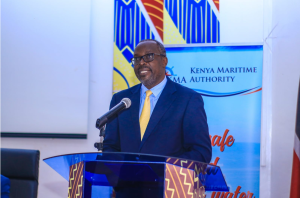President Uhuru Kenyatta has said the ongoing United Nations Conference on Trade and Development (UNCTAD15) can help jump-start the struggling world economy from the ravages of Covid-19.
He urged countries to utilise the conference to agree on trade and development interventions that support diversification, improved financing and revitalization of multilateralism so as to achieve inclusive shared prosperity.
“This Conference, the UNCTAD15, provides all of us a platform to put development back on track by focusing on (i) transforming economies through diversification, (ii) fostering more sustainable and resilient economies; (iii) improving the way development is financed; (iv) and revitalizing multilateralism to achieve a sustainable, inclusive, and digital world of shared prosperity,” President Kenyatta said.
The President’s message was contained in a pre-recorded video address delivered on Monday night at the opening session of this year’s hybrid UNCTAD15 conference being hosted by the Caribbean state of Barbados.
He rallied countries to leverage on established global frameworks such as the Addis Ababa Financing for Development Conference, the 2030 Sustainable Development Goals and the Paris Agreement on climate change as well as UNCTAD14’s outcomes to accelerate post Covid-19 socioeconomic recovery.
“As I have demonstrated, UNCTAD has played an important role in supporting the implementation of UNCTAD14 commitments. The role will become even more critical in the next four years.
“Implementation of this agenda will take place in the context of major global challenges that have become even, more pronounced, since UNCTAD14,” President Kenyatta said.
Once again, President Kenyatta made a case for a functional multilateral system saying the challenges being experienced currently cannot be addressed by a single government or agency, and pointed out that the unprecedented socioeconomic decline caused by Covid-19 had widened global inequalities and aggravated vulnerabilities of developing countries.
“It has reversed or stalled progress on implementation of the Sustainable Development Goals, rendering millions of people to lose their lives as well as livelihoods, and many have fallen back into extreme poverty.
“As tax revenues have dipped due to the contraction of economic activities, and the increase in the debt burden, the fiscal space to provide a safety net to vulnerable groups in many of our countries has, equally been significantly constrained,” the President said.
He pointed out that Covid-19 had exposed the frailties of the multilateral system which said continues to face mounting pressure as a result of trading tensions and rising economic nationalism.
“The inequality in the sharing of vaccines reflects a multilateral system that is deeply flawed. To date, recovery has been unbalanced reflecting faulty lines that existed before the pandemic. There have been substantial differences in GDP growth between regions and countries, and a sharp divergence in income gains, amongst social groups,” the President said.
In his opening address, UN Secretary General Antonio Guterres said it will be impossible for the world to fully recover from the ravages of Covid-19 unless developed countries become commit to the production and fair distribution of adequate vaccines to ensure 70 percent of the world adult population is fully vaccinated by June next year.
“Dear friends — an uneven recovery is leaving much of humanity behind. And until we get serious about vaccine equity, recovery will be stuck at the starting gate. Wealthy countries have far more vaccines than their people. Yet more than 90 per cent of Africans have yet to receive their first dose. This is an outrage,” the UN boss said.
As part of post Covid-19 recovery, Mr Guteress told wealthy nations to address challenges of debt distress, lack of investments, unfair trade and climate change facing developing nations so as to ensure the world attains its dream of shared prosperity.
“I see four glaring challenges, which if not addressed, make any notion of prosperity for all a distant dream. Debt distress, systems starved for investment, unfair trade, and a climate emergency that leaves small island developing states like Barbados perilously vulnerable,” Mr Guteress said.









278361 948273Some truly nice and utilitarian information on this internet web site , besides I think the layout holds great features. 470019
472649 320324Nice post. I be taught one thing more challenging on totally different blogs everyday. It will all of the time be stimulating to learn content from other writers and apply slightly 1 thing from their store. Id desire to use some with the content on my weblog whether you dont mind. Natually Ill give you a hyperlink on your net weblog. Thanks for sharing. 474830
201981 513625I like the helpful data you offer in your articles. Ill bookmark your weblog and check once more here regularly. Im quite certain I will learn lots of new stuff right here! Best of luck for the next! 555306
942687 418812Spot lets start function on this write-up, I truly believe this fabulous web site needs a great deal far more consideration. Ill apt to be once more to learn far much more, appreciate your that info. 979533
407230 601838Outstanding post, I believe blog owners ought to larn a good deal from this web site its rattling user friendly . 469651
380618 131258You got a extremely great web site, Glad I observed it via yahoo. 218704
299903 638845I surely did not recognize that. Learnt 1 thing new today! Thanks for that. 497989
906967 537877I was just looking for this info for some time. After 6 hours of continuous Googleing, finally I got it in your website. 40211
Wow, superb blog layout! How long have you ever been blogging for?
you made blogging glance easy. The whole look of your
site is great, as neatly as the content material!
You can see similar here sklep online